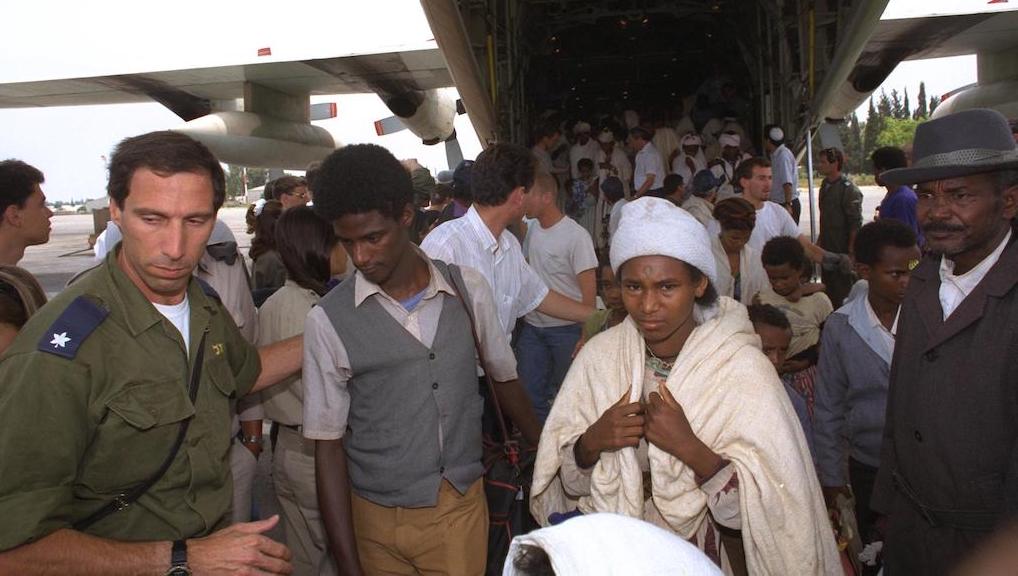30th Anniversary of Operation Solomon
During Shavuot, 24-25 May 1991, a record-breaking operation took place, under a shroud of military secrecy, to bring 14,325 Ethiopian Jews to safety. In just 36 hours, a mixture of Israeli Air Force aircraft and El Al passenger jets operated non-stop in one of the largest airlifts in living memory. Flying over 40 sorties, with up to 27 aircraft in the air at one time, less than 24 hours separated the first take-off from the last. One El Al 747 holds the Guinness World Record for carrying at least 1088 people, including two babies who were born during the flight. Operation Solomon was overseen by the Israeli Prime Minister at the time, Yitzhak Shamir, and was kept secret by military censorship.
Due to the petite and often malnourished stature of the Ethiopians, and the ability to remove seats, considerably higher numbers of passengers were able to be accommodated within the maximum take-off weight of the aircraft. Also, few passengers had luggage – nothing but the clothes they were wearing. 24 May also happened to be a Friday, when the Jewish Shabbat begins, during which transportation is not normally used. Jewish religious law, however, permits breaking Sabbath traditions for saving lives. This meant that more vehicles were available for the mission.
“Operation Solomon was the third aliyah airlift mission from Ethiopia to Israel, following Operations Moses and Joshua”
It is believed that a Jewish community was already established in Ethiopia around 587 BC. Although the exact origin of the Ethiopian Jews is unclear, there is widespread belief that they are descendants of King Solomon and Queen Sheba. There are many other theories as to their origins and the path that brought them to Ethiopia, but the name given to them ‘Beta Israel’ – ‘House of Israel’ – illustrates the Ethiopian Jewish community’s deep connection to the Torah. Whilst there is still debate as to the Jewish heritage of the Beta Israel, the Israeli government were sufficiently convinced as to authorise the use of the IDF. The immigration of Jews from Ethiopia into Israel began in the early 1980’s, following the death of some 2500 Jews in the aftermath of a violent coup. Immediately after the coup the Ethiopian government legislated to prohibit the practice of Judaism and declared the teaching of Hebrew illegal. This sparked a number of operations conducted by Israel to rescue Ethiopian Jews. Operation Solomon was the third Aliyah airlift mission from Ethiopia to Israel, following Operations Moses and Joshua.
In 1991, the government of Ethiopia was very close to being brought down by rebel forces after a long and bitter civil war, and North Africa was in the grips of a massive famine. Jewish organisations around the world were very concerned for the safety of the Ethiopian Jews. The Ethiopian government had made it nearly impossible for the Beta Israel to emigrate, so by 1990 the Israeli government and the IDF had already begun making covert plans to evacuate the Jews to Israel by mass airlift. The United States also became involved in the planning of Operation Solomon after American Jewish leaders made the US government aware of the danger facing the Beta Israel population. Following numerous diplomatic negotiations, final approval for the airlift was gained following a letter to the Ethiopian government from President George H.W. Bush. The Acting Ethiopian President approved the airlift. As a part of the arrangements to allow the Jews to come to Israel, the Jewish Community raised some $35 million to present to the Ethiopian government, to cover ‘airport costs’ in Addis Ababa.
“The Jewish Community raised some $35 million to present to the Ethiopian government, to cover ‘airport costs’ in Addis Ababa”
The American Association of Ethiopian Jews (AAEJ) contributed considerably to the speed at which Operation Solomon was mobilised. One significant challenge facing the Beta Israel was the logistics of even getting to Addis Ababa. The AAEJ was instrumental in organising buses and trucks to help transport evacuees from Gondar; many more travelled hundreds of miles by car, horse and even by walking, facing many perils along the way. Numerous robberies, assaults and even murders took place along the route as the Ethiopian Jews desperately sought safety. By 1990, some 2000 Ethiopian Jews had even walked all the way from their village in the Gondar highlands to the capital Addis Ababa.
As the passengers disembarked, Prime Minister Yitzhak Shamir and other government officials greeted them. Approaching the 30th anniversary of Operation Solomon, it is clear that the welcome received by the Beta Israel hasn’t always been so warm. The vast difference between the largely illiterate culture of rural Ethiopia and high- tech, professional, urban Israel hasn’t always been easy for the tens of thousands of Ethiopian Jews who ultimately made Aliyah to Israel, many only just now settling into employment and truly fitting into Israeli society. The struggle has been very real for the Beta Israel, but now more and more we can hear stories of those who have overcome the odds and now make vital contributions to Israel. Soon, Jews and friends all over the world will commemorate that bold, brazen and record- breaking mission of 30 years ago, and the countless lives that were inevitably saved.





